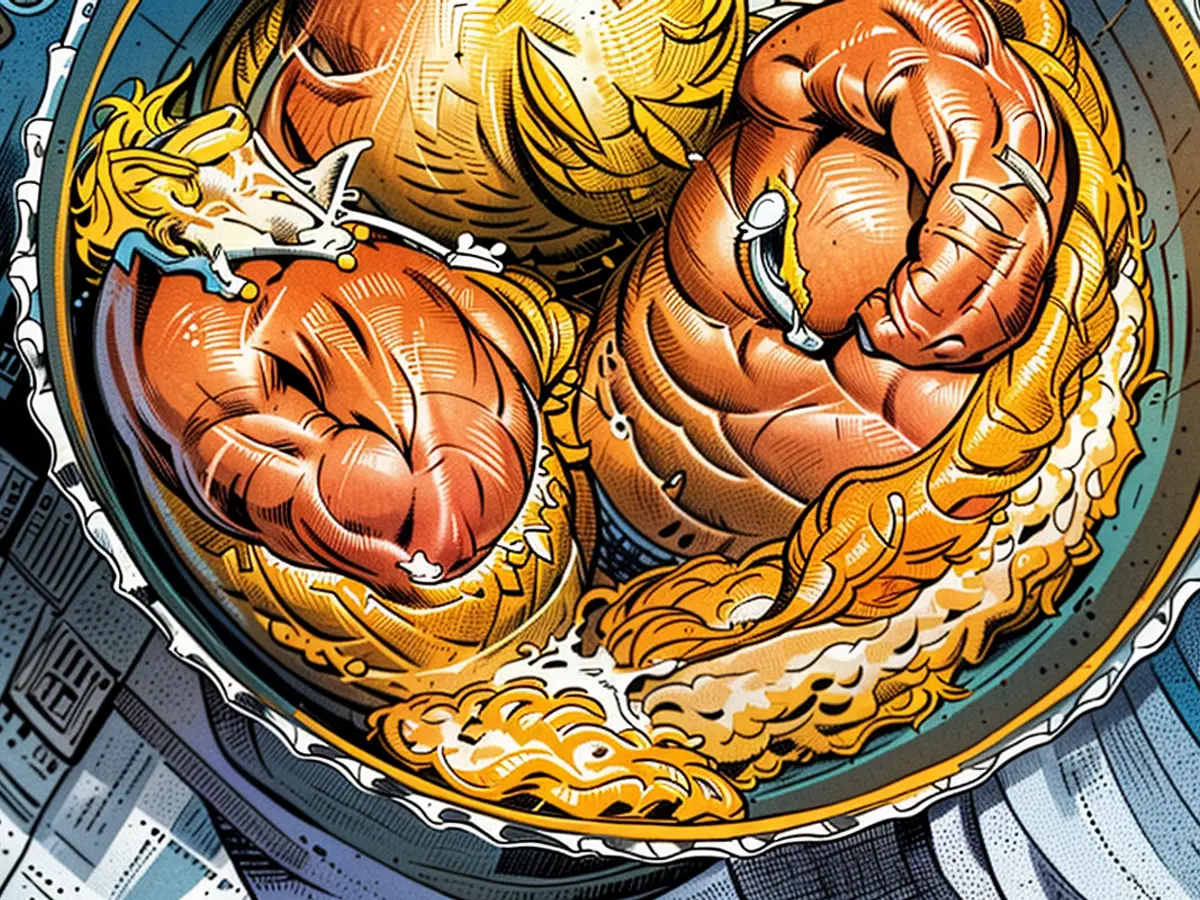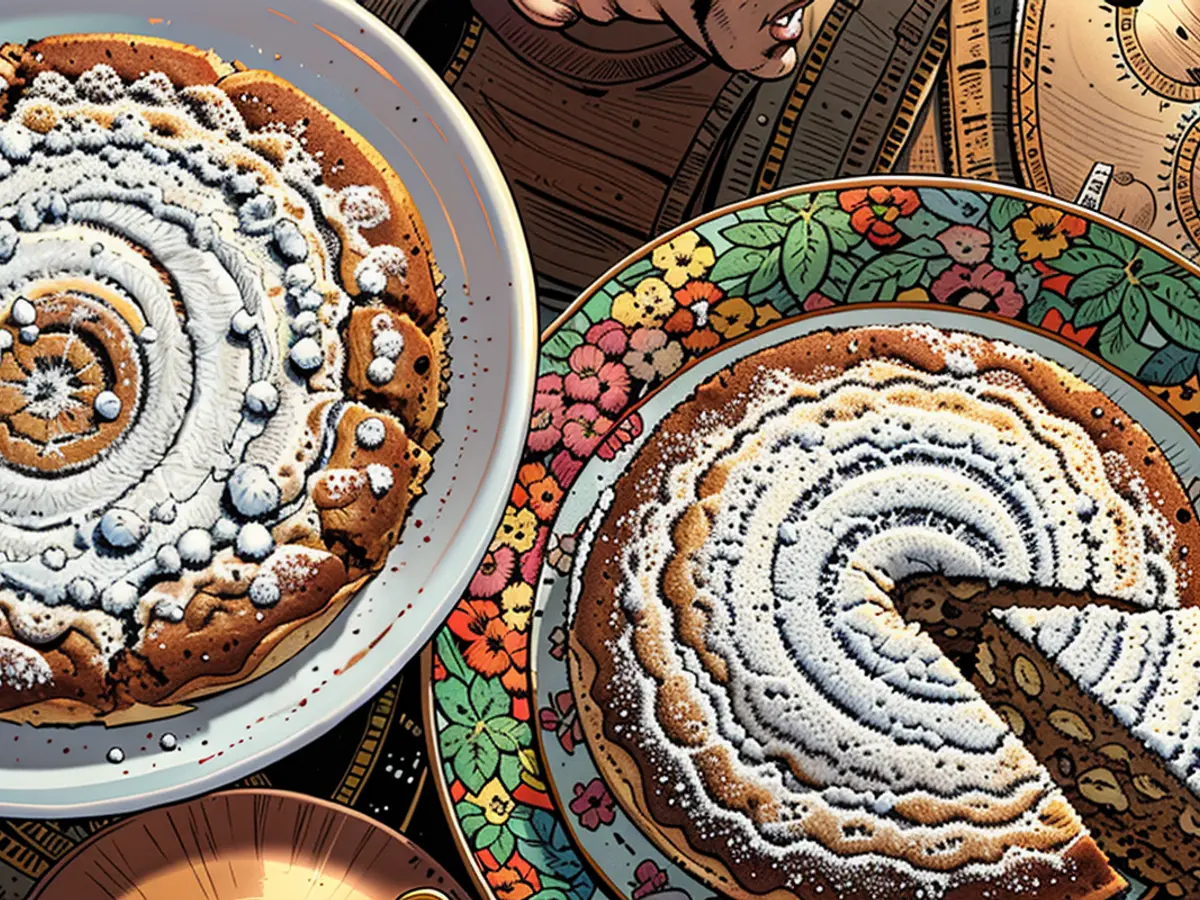Every bite is a piece of luck
"Either with love or not at all" is the motto of twin sisters Forough and Sahar Sodoudi, both successful scientists. In 2019, they switch to the kitchen - out of passion for enjoyment and with the vision of making Persian culture tangibly and culinaryly experienceable.
"Here flows the love" - there could be no better title for this book. Forough, "dawn" in German, and Sahar, "early morning", have written it. This is their first cookbook, after all, they only decided five years ago to rewrite the story of their lives. How they both ended their successful scientific careers and built a "kitchen lab" in Berlin with the same care and attention is reported in their remarkable book.
"Either with love or not at all" is the motto of the twin sisters Forough and Sahar Sodoudi, and they invite you to a culinary journey through Iran with their book. Between all the recipes for vegetarian meze and pickled vegetables, salads, stews and rice dishes, meat and fish, desserts and drinks, the personal life story of the two women, written by Caroline Bushra von der Goltz, always catches the eye. The impressive and profound book is published by the Brandstätter Verlag. If you want to dive deeper into the colorful world of Persian cuisine, you can do so directly with the two PhD scientists in Berlin. The passionate hosts, who had achieved everything career-wise, exchange climate science and geophysics for spatulas and aprons and found the "Dr & Dr Middle Eastern Culture and Food Lab" in 2019.
Their success speaks for itself: In 2020, they win the German Gastro Founders Award, an award for the five best founding ideas and concepts from Germany, Austria and Switzerland: "Sometimes we cried with gratitude: for all the challenges we had faced and overcome - in our childhood and youth, during our studies, in our leadership positions or because of the many moments of intentional and unintentional letting go. Every hard day has shaped us and ultimately formed the individuals we are today. The book you are holding in your hands is the sum of these experiences - and a fascinating collection of recipes that have made people particularly happy in our cooking classes. It is a feast for the soul, the eyes, and of course, the palate."
Dishes, hospitality, stories
Love is the center of this book: it is written lovingly, about love, and conveys the belief that love withstands hate and violence, that it is invincible. This might sound cheesy, but it is not, as the story of the two twin sisters is far from rosy. They and their parents have had to experience what hate against those who think differently and violence against women means. Their stories about childhood, youth, and adult life captivate me. The memories of their life in Tehran are exciting and profound, making me thoughtful and also angry. And yet, it is love and togetherness in the families that give hope and inspire hope for a change even in Iran. I read all these wonderful stories first, only then do I remind myself that "Here flows the love" is a cookbook with diverse dishes from the culinary Persia.
The recipes vary greatly in difficulty, with some being very simple, while others require time and patience. The ingredients are available in well-stocked supermarkets, health food stores, Persian, Turkish, or Asian grocery stores, as well as online retailers. The authors reveal their six absolute favorite dishes - of course, with the corresponding recipes!
The book is divided into three main sections: Dishes, Hospitality, and Stories. The eight chapters from Starters to Drinks in "Dishes" are preceded by brief explanations about the significance of the respective dishes in Persian cuisine. Here, we learn what is particularly popular, what should never be missing, or which spices make the difference. For "Advieh Khoreshti", a special spice mix for stews (Khoresh), there is of course also a recipe. The exact composition can vary depending on the region and personal preferences. "Our own mix, which we have carefully perfected over the years, gives every Khoresh dish an incomparable taste that is characterized by both sweetness and heartiness." Saffron, the shining jewel of Persian cuisine, is a fixed component of culture and tradition and is described with devotion. In many recipes, you will find "saffron water" as an ingredient:
Saffron Water

For this, you need 1/3 g of saffron and 5 ice cubes from 120 ml of water: "Grind the saffron threads in a mortar and pestle by rotating and pressing simultaneously, then place them in a glass with the ice cubes. Wait until the ice cubes have melted. If the saffron water should be less intense, hot water can be added at the end. If less or more saffron is needed for a recipe, the amount of ice cubes can be adjusted accordingly. Depending on the recipe, the ratio of ice cubes to saffron can also vary. For example, if 60 ml of saffron water with 1/2 g of saffron is needed, then correspondingly fewer ice cubes (2-3) but more saffron than in the basic recipe are used - thus creating a more intense saffron water."
Almost no one in Iran without a double life
Above all, the chapters in the "Hospitality" and "Stories" sections are very personal, ranging from lavishly set tables to the murder of Iranian Kurdish woman Mahsa Amini. In 1997, Forough and Sahar were arrested by the morality police and taken to the notorious "Vozara" station. Years later, Mahsa Amini was dragged there and beaten: she died on September 16, 2022, at 3:30 PM. "Since September 2022, more than 18,000 people have been illegally detained and some have been tortured; more than 1,000 people have been killed on the streets. Among them are many young women." Without the last chapter of the book with the title "Woman. Life. Freedom.", the twin sisters could not have written this book: "We cannot write a Persian cookbook without standing in solidarity with the women in Iran. Without giving them space, expressing our respect for them. Without thanking them for their courage, their resistance, their tirelessness. We cannot write a Persian cookbook without remembering them." Consequently, the chapter bears the slogan of the protesters that went around the world after Mahsa Amini's death. Also in Berlin in 2022, tens of thousands took to the streets with the cry "Woman. Life. Freedom."
Forough and Sahar were born in Berlin in 1995 and moved to Tehran with their parents, who came from non-religious families and had studied in Berlin, when they were five years old. They grew up, studied, and demonstrated against the regime there. "The pervasive atmosphere of oppression forced us to lead a double life. While we had to comply unconditionally with the system's rules in public spaces, we lived a modern life full of colors, joy, and happiness in secret." After their father's arrest and numerous repressions, the family wanted to return to Germany - a years-long odyssey in Iran began. Their childhood and youth were shaped by decrees and paternalism, from listening to music to watching Western films. The girls studied and secretly threw parties, drank homemade raisin vodka, always had a few pickles on hand to mask the vodka smell, and delighted in every trick they could play on the hated morality police. Not all of this ended well, and arrests could not always be prevented: "The boys were shaved bald and received 75 lashes on their backs. The girls were punished with 25 lashes on their palms." But every successful party was a triumph! "Bodies and minds don't forget such events. Even many months after we arrived in Germany, our hands would automatically reach for our heads whenever we saw a police car. Because of the missing hijab. These things leave a mark. Still, we always tried to enjoy life - and stick together." Forough and Sahar Sodoudi returned to Berlin in 2000. Forough earned her PhD in seismology and spent 14 years as a researcher at the GFZ Potsdam. She is now the director of a graduate program in mathematics. Sahar earned her PhD in physics and meteorology, holds a professorship in urban climate and sustainability at the Free University, and leads numerous third-party projects in the Middle East. In 2019, both made the brave decision to leave their scientific careers to pursue their passion for culture and history. They quote from a poem by the Persian poet Omar Khayyam:
"If, drunk on red wine,You listen to your beloved's tenderness,Enjoy it now in this time,For the great nothing is not far away."
This poem becomes their guiding principle: "We have only one life - and we want to experience it in the most beautiful way." So they rewrite their story.
Persian Saffron Rice with Tahdig (Berenj e Safrani ba Tahdig)
"Saffron rice is the heart of Persian cuisine. It symbolizes the diversity of Iran, where vibrant aromas meet patience and devotion. The warm dish made from five ingredients is never eaten alone. It brings people together. It's almost a tradition to argue over Tahdig, the golden crust."

Preparation:
Wash rice in warm water, changing the water three times. Soak in a pot with cold water and 2 teaspoons of salt - the water should be about 1 cm above the rice - for 15 minutes.
Add cold water so that it is about 5 cm (two finger widths) above the rice. Cook without a lid over high heat. As soon as the rice grains start to move, it will take another 3 minutes to be al dente. The total cooking time is about 10 to 13 minutes.
Drain the rice in a sieve (preferably metal) until no more liquid is present. Shake the sieve. The rice can also be loosened with a large spoon, but it must not be stirred.
Boil the pot hot and pour in enough saffron water to cover the bottom. Add the oil and wait until the liquid starts to boil.
As soon as it does, loosely fill the pot with a thin layer of rice using a large spoon, which will later form the crust. Then add more rice layer by layer, without stirring or pressing down. Drizzle a little saffron water over each layer. Pour the remaining saffron water over the last layer and gently mix the top rice grains with a spoon. Optionally, add butter.
Wrap the pot lid with a kitchen towel and place it on the pot. After about 10 minutes, once steam is created in the pot, reduce the heat and let the rice cook for another 35 minutes at low temperature. Then remove the lid and place a large plate upside down on the pot. Turn the pot over to let the finished rice fall onto the plate, forming a cake-like structure with a golden saffron crust.
Serve with braised dishes, meat, or fish.

Giant Prawns Sautéed in a Chili-Garlic-Coriander Paste (Shahmeygoo)
"This quick dish involves sautéing plenty of coriander, garlic, and chili to create a spicy, zesty paste. We then add freshly cleaned giant prawns, deglaze with white wine, and finally dip toasted baguette into the nourishing sauce. Any questions?"
Instructions:
Carefully cut the underside of the prawns but do not cut all the way through, and remove the vein with a sharp knife.
Cut the chilies into fine slices. Combine them with peeled and crushed garlic and chopped coriander in a cold pan. Add 10 tbsp of oil and sauté over medium heat for 8 minutes.
Add the prawns and 2 more tbsp of oil, and cook over high heat until they turn pink on both sides.
Pour in the wine and let it simmer with the lid closed for another 8 minutes.
North Iranian Walnut Cake (Kaka)

"This mild delicacy from the Gilan province in northern Iran combines the rich texture of walnuts with the distinctive aroma of cardamom and the unique fineness of rice flour. The result is a light cake that's easy to prepare and best enjoyed with a glass of tea or a cup of cardamom coffee."
Instructions:
Preheat the oven to 160°C (convection). Line the bottom of a springform pan with parchment paper and secure it. Grease the sides of the pan with butter.
Finely chop the walnut kernels in a blender.
In a mixing bowl, combine the nuts with rice flour, sugar, cardamom, cinnamon, salt, rose water, baking soda, and eggs. Mix well with the blender's beaters.
Add enough milk or water to create a creamy batter. Pour it into the springform pan and smooth the surface. Bake for 40 minutes in the oven.
Optionally, dust the cake with powdered sugar.
Happy baking! Wishes, Heidi Driesner.

The twin sisters Forough and Sahar Sodoudi, driven by their passion, switched from scientific careers to sharing Persian cuisine in 2019. They believe that food and nutrition can make Persian culture tangible and enjoyable.
In their first cookbook, Forough and Sahar share not only diverse dishes from the culinary Persia but also their personal life stories, which often revolve around love and overcoming challenges.






